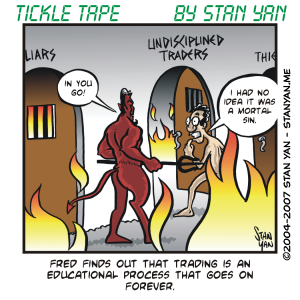Novice traders often hold an erroneous belief that traders are natural-born, and thus, by instinct, they can handle anything the market throws at them. Natural born traders see good trade setups instinctively and can close a trade like a virtuoso. But much of this is folklore. Traders are made, not born. It’s necessary to hone your trading skills through practice and experience. You can’t expect yourself to know everything right away. When you’re caught off guard and you lose because of an unanticipated set of market conditions, don’t berate yourself by thinking, “I’m a dummy. I should have known that.” How could you know? Do you have infinite, infallible knowledge? Do you have a lifetime of trading experience? You can’t expect to trade like a seasoned trader without experience and practice.
Everyone has different talents. Some people can see patterns more quickly than others. They’re artistic and see structure in a seemingly random array. Other people are math wizards who can process numbers with lightning speed. Still, others can stay cool under pressure, calmly surveying the landscape and making logical, astute decisions. Everyone has a different learning curve when it comes to trading, and it is necessary to remember that. Two people can trade side by side, with one person picking up techniques faster than the other, but that doesn’t mean that in the end, one person will be a better, more profitable trader than the other. Even if one of the pair was more talented than the other initially, it is quite possible that both people will end up as seasoned, master traders.
Everyone has different talents and backgrounds. Sure, if a person grew up in and around the trading industry, he or she may know a little more than the average novice, but no background ensures success. Over the course of a career, it’s quite possible that a late bloomer can outperform an early rising star. If you berate yourself for not being skilled enough, or not having enough trading experience, you will sabotage your efforts. Comparisons to others are worthless. If you think you must perform up to some external standard before you’re ready, you’ll never achieve what you’re striving for. You will choke under the extreme pressure you are putting on yourself. Take your time. Give yourself an opportunity to gain the experience you need. You can’t expect to trade like a master overnight.
When learning how to trade, it is vital to gain experience across a variety of market conditions. That takes time, considering that the knowledge base of many novice traders is essentially a blank slate. Most novice traders have relatively little real-world trading knowledge. Over time, however, they will accumulate the requisite knowledge they need to trade like a master. Until then, it is necessary to ease up a little, if you are new to the trading business. Give yourself time.
Instead of beating yourself up for having limited knowledge, begin each trading day by thinking, “Of course, I don’t know what’s going on. I have a lot to learn.” It’s better to go in with an upbeat, optimistic attitude. Don’t think, “How is the market going to show me up today?” Instead, it’s more inspiring to think, “I wonder what new knowledge I’m going to acquire today?” By easing up on yourself, you’ll be open to gaining valuable experience, and eventually, you’ll hone your skills and trade like a master trader.


